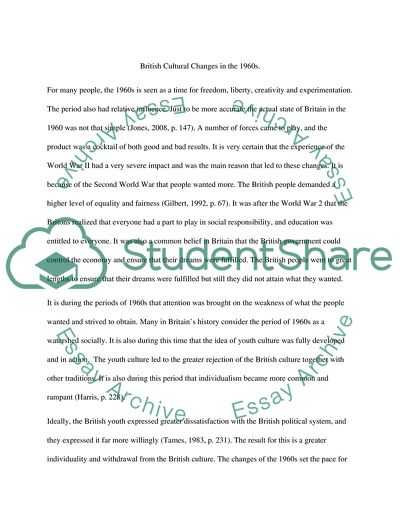Cite this document
(“British Cultural Changes in the 1960s Essay Example | Topics and Well Written Essays - 1750 words”, n.d.)
British Cultural Changes in the 1960s Essay Example | Topics and Well Written Essays - 1750 words. Retrieved from https://studentshare.org/culture/1690618-the-1960s-are-often-seen-as-a-period-of-great-cultural-change-discuss-the-evidence-for-this-viewpoint
British Cultural Changes in the 1960s Essay Example | Topics and Well Written Essays - 1750 words. Retrieved from https://studentshare.org/culture/1690618-the-1960s-are-often-seen-as-a-period-of-great-cultural-change-discuss-the-evidence-for-this-viewpoint
(British Cultural Changes in the 1960s Essay Example | Topics and Well Written Essays - 1750 Words)
British Cultural Changes in the 1960s Essay Example | Topics and Well Written Essays - 1750 Words. https://studentshare.org/culture/1690618-the-1960s-are-often-seen-as-a-period-of-great-cultural-change-discuss-the-evidence-for-this-viewpoint.
British Cultural Changes in the 1960s Essay Example | Topics and Well Written Essays - 1750 Words. https://studentshare.org/culture/1690618-the-1960s-are-often-seen-as-a-period-of-great-cultural-change-discuss-the-evidence-for-this-viewpoint.
“British Cultural Changes in the 1960s Essay Example | Topics and Well Written Essays - 1750 Words”, n.d. https://studentshare.org/culture/1690618-the-1960s-are-often-seen-as-a-period-of-great-cultural-change-discuss-the-evidence-for-this-viewpoint.


